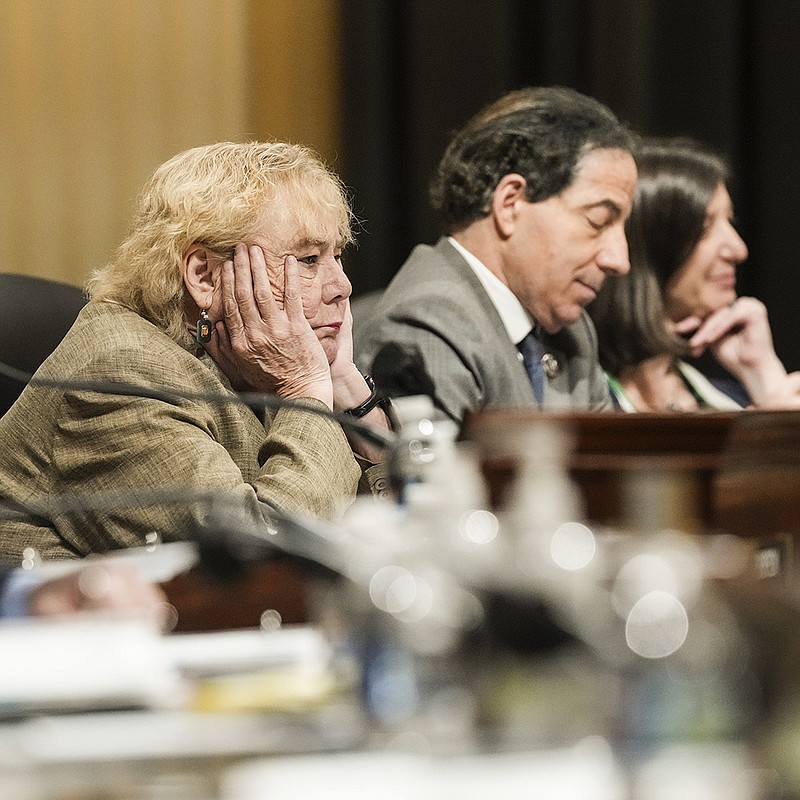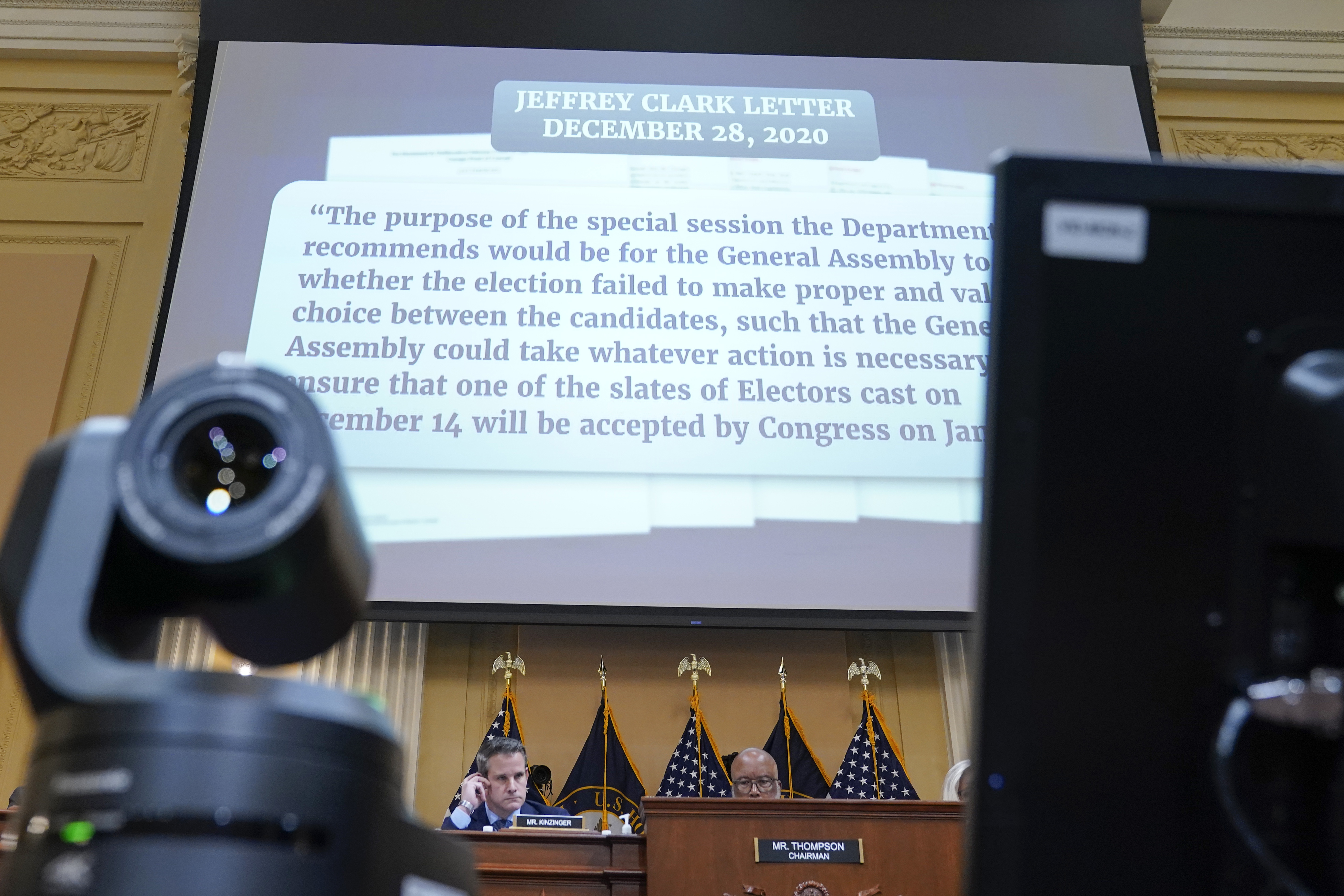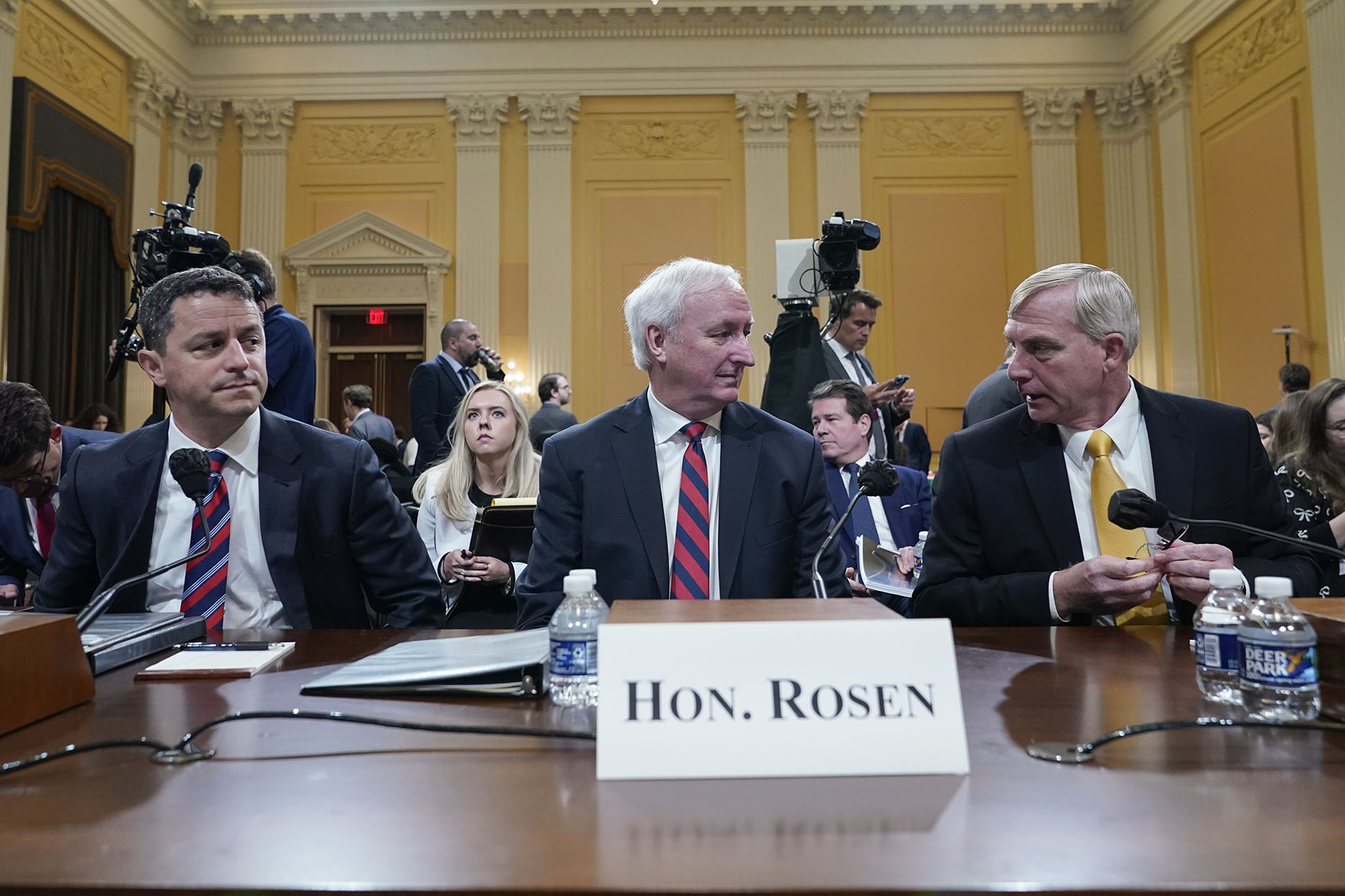WASHINGTON -- Federal agents searched a former top Justice Department official's home and seized records from key Republicans in at least five states linked to Donald Trump's efforts to overturn the 2020 election, in what were clear signs that authorities are ramping up their investigation of associates of the former president.
Authorities on Wednesday searched the Virginia home of Jeffrey Clark, who was known at the Justice Department to champion Trump's claims of election fraud. Agents in recent days also served subpoenas on the Republican Party chairmen of Arizona, Nevada and Georgia, three states that went for President Joe Biden and where Trump allies created slates of "alternate electors" intended to subvert the vote. And Republicans in two other states -- Michigan and Pennsylvania -- disclosed they had been interviewed by the FBI.
The Justice Department appears to be escalating its probe of pro-Trump efforts to overturn the 2020 election, which culminated in the deadly Jan. 6 riot. The disclosures of law enforcement activity came as the U.S. House committee investigating the riot said it had new evidence of Trump's efforts and his knowledge that he had no legal basis to try to overturn the election.
The committee's Thursday hearing focused on Trump's desire to install Clark atop the Justice Department in his administration's last days. The reason for the search of Clark's home was not immediately clear and it was not known what information agents were searching for.
Both the committee and federal authorities are probing the use of replacements for duly chosen electors in seven battleground states that voted for Biden. Trump and his allies furiously pressured authorities in those states to replace Biden's electors with ones for him on specious or nonexistent allegations that his victory was stolen.
The committee this week disclosed text messages that showed an aide to U.S. Sen. Ron Johnson, a Wisconsin Republican and Trump ally, tried to hand-deliver fake elector certificates to an aide for former Vice President Mike Pence. The texts show Pence's aide refused to accept the votes.
Johnson told a Wisconsin conservative talk radio host on Thursday that the fake elector slates came from the office of Rep. Mike Kelly of Pennsylvania. A spokesman for Kelly responded that Johnson's claim was "patently false."
Said the spokesman, Matt Knoedler, "Mr. Kelly has not spoken to Sen. Johnson for the better part of a decade, and he has no knowledge of the claims Mr. Johnson is making related to the 2020 election."
Among those who have received subpoenas in recent days, according to a person familiar with the matter, was Georgia Republican Party chairman David Shafer.
Nevada GOP Chair Michael McDonald turned over his phone to federal agents Wednesday when they approached him outside his car in Las Vegas and presented a warrant, according to another person familiar with the matter. McDonald in December 2020 stood outside Nevada's state capitol with other fake electors to swear a so-called "oath of office," flanked by men in camouflage with semi-automatic rifles.
Arizona Republican Party Chair Kelli Ward, her husband, Michael Ward, and two other alternate electors also received subpoenas, according to a third person familiar with the matter.
In Pennsylvania, FBI agents interviewed the chairman of the Allegheny County Republican Party at his home Thursday and gave him a subpoena for communications between him, Trump electors in the state and members of Trump's campaign and legal team, the party official, Sam DeMarco, told the Pittsburgh Post-Gazette.
DeMarco said in a statement that his conduct as an elector was "open, above-board and predicated solely on protecting President Trump's legal rights should he prevail in court. That is why I agreed to serve as an elector solely in the event the president prevailed in his legal challenge to the Pennsylvania vote."
And in Michigan, Michele Lundgren told the Detroit News that someone from the FBI served her with a subpoena Thursday and that another Trump elector was served on Wednesday. Lundgren, 72, said her discussion with the agent was "long" and "pleasant" and that she let one of the agents go through her phone and computer.
"They kept asking me questions and asking me questions, and I kept telling them answers," she said.
Clark's home was searched by federal agents shortly before a committee hearing in which he was the focus. Three other former Justice Department officials testified about an extraordinary Jan. 3, 2021, Oval Office meeting at which Trump contemplated naming Clark -- who led the department's civil division -- as acting attorney general in place of Jeffrey Rosen, who resisted Trump's efforts to involve the agency.
Trump relented only when other senior Justice Department officials warned him that they would resign if he followed through with his plan to replace Rosen with Clark.
A lawyer for Clark did not return an email and phone message seeking comment.
Chairman Bennie Thompson said he read about the raid on Clark's home moments before the hearing started. "We're not privy to what the Department of Justice's reasoning is for doing it," he said. "As you know, we demonstrated that he was recommended to lead the Department of Justice and people felt that he was absolutely unqualified to do so."
"The president cannot and must not use the department to serve his own personal interests," said Rep. Adam Kinzinger, R-Ill., who led questioning during the fifth public hearing this month to lay out the panel's findings. "And he must not use its people to do his political bidding, especially when what he wants them to do is subvert democracy."
Russ Vought, president of the Center for Renewing America, which Clark recently joined as a senior fellow, tweeted that federal officers forced Clark "into the streets" while he was wearing pajamas and "took his electronic devices."
"All because Jeff saw fit to investigate voter fraud," Vought continued. "This is not America, folks. The weaponization of govt must end. Let me be very clear. We stand by Jeff and so must all patriots in this country."
OTHER REVELATIONS
The panel made several other revelations Thursday.
The committee presented evidence that the White House knew the president's plan was unlawful, playing video of Eric Herschmann, a lawyer in the White House counsel's office, recounting how, after hearing Clark detail it, he used a pair of expletives and said: "Congratulations, you just admitted your first step or act you'd take as attorney general would be committing a felony."
The panel also played new testimony from former Attorney General William Barr in which he suggested in a videotaped deposition that he was aware that Trump wanted to use false claims of voter fraud as a pretense for refusing to leave office. Had he not moved quickly to investigate and debunk Trump's voting fraud allegations, Barr said, "I'm not sure we would have had a transition at all."
It heard from Rosen; Richard Donoghue, a former acting deputy attorney general; and Steven Engel, a former assistant attorney general for the Office of Legal Counsel, who recounted how they resisted the president's repeated and increasingly urgent entreaties for them to intervene to invalidate his defeat.
The committee emphasized how Trump and his allies searched the internet for any theory to try to keep him in power, even persuading the acting defense secretary to call the Italian government to investigate the debunked "Italygate" theory that claimed that Italian defense contractors had flipped votes for Trump to Joe Biden using satellites.
The hearing captured in detail how Rosen and Donoghue fought back against Trump's and Clark's efforts. The men threatened mass resignations rather than go along with the plans. Their denunciations were so blunt and so dismissive that they underscored how bad the ideas were that Trump pursued. "Pure insanity," Donoghue wrote in an email about the Italygate theory; he told the committee he found it "patently absurd." There was audible laughter in the room when Donoghue recounted how he told Clark he was unqualified to be installed as attorney general: "You're an environmental lawyer. How about you go back to your office, and we'll call you when there's an oil spill."
The committee displayed on a large screen Donoghue's handwritten note of Trump's instructions to the Justice Department: "Just say that the election was corrupt + leave the rest to me and the R. Congressmen."
The committee also presented evidence that Republican lawmakers who played crucial roles in Trump's plan to try to overturn his loss in Congress sought pardons after the Jan. 6 attack. It showed testimony by an aide to Mark Meadows, the White House chief of staff, that Reps. Matt Gaetz of Florida, Mo Brooks of Alabama, Andy Biggs of Arizona, Scott Perry of Pennsylvania and Louie Gohmert of Texas were among those asking to be shielded from prosecution. She said she had heard from a lawyer in the White House counsel's office that Rep. Marjorie Taylor Greene of Georgia had sought a pardon as well.
The panel revealed more information about Perry's prominent role in Trump's efforts to force the Justice Department to act. He introduced Clark to Trump and then pushed to install Clark as attorney general. Perry also forwarded and encouraged debunked internet conspiracy theories.
The panel is planning at least two more hearings for July, according to its chair, Rep. Thompson. Those sessions are expected to detail how a mob of violent extremists attacked Congress and how Trump did nothing to call off the violence for more than three hours.
Information for this article was contributed by Michael Balsamo, Eric Tucker, Nomaan Merchant, Scott Bauer, Sara Burnett, Marc Levy, Sam Metz and Michelle L. Price of The Associated Press and Luke Broadwater of The New York Times.
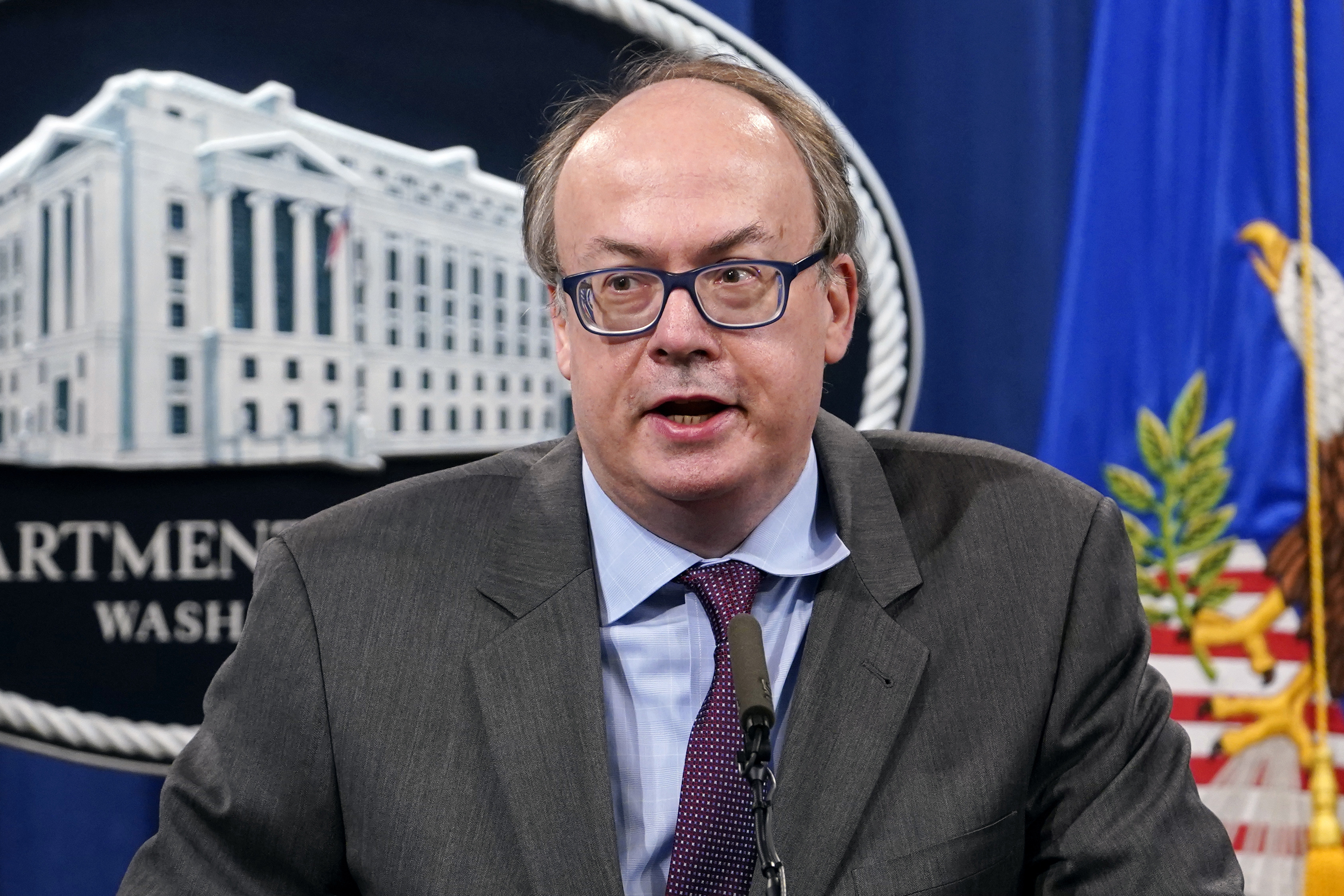 FILE - Jeffrey Clark, then-Assistant Attorney General for the Environment and Natural Resources Division, speaks during a news conference at the Justice Department in Washington, on Sept. 14, 2020. Federal agents have searched the Virginia home of the Trump-era Justice Department official who championed efforts by President Donald Trump to overturn the results of the 2020 election. (AP Photo/Susan Walsh, Pool, File)
FILE - Jeffrey Clark, then-Assistant Attorney General for the Environment and Natural Resources Division, speaks during a news conference at the Justice Department in Washington, on Sept. 14, 2020. Federal agents have searched the Virginia home of the Trump-era Justice Department official who championed efforts by President Donald Trump to overturn the results of the 2020 election. (AP Photo/Susan Walsh, Pool, File)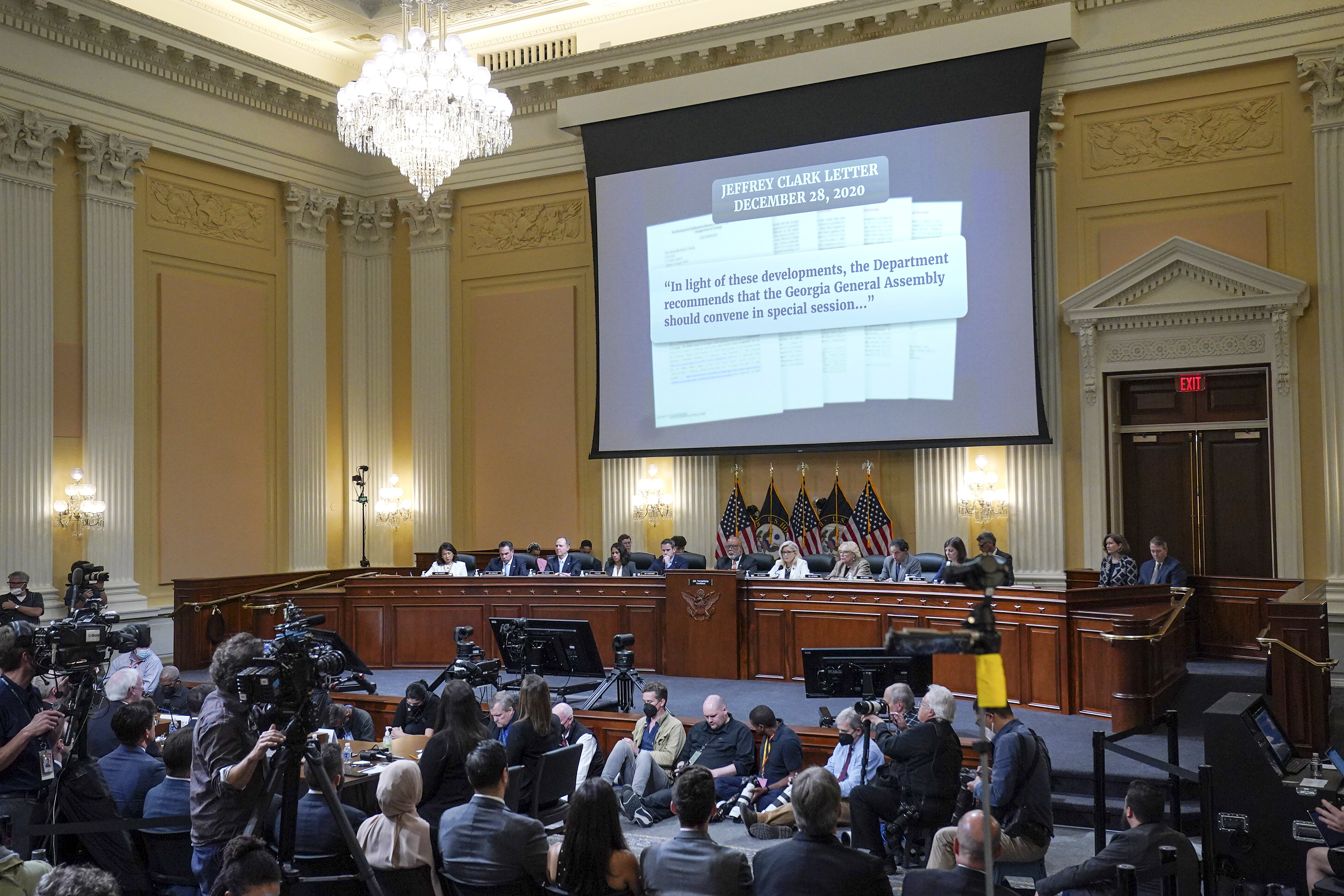 A letter from former Justice Department official Jeffrey Clark is shown on a screen, as the House select committee investigating the Jan. 6 attack on the U.S. Capitol continues to reveal its findings of a year-long investigation, Thursday, June 23, 2022, at the Capitol in Washington. (Demetrius Freeman/The Washington Post via AP, Pool)
A letter from former Justice Department official Jeffrey Clark is shown on a screen, as the House select committee investigating the Jan. 6 attack on the U.S. Capitol continues to reveal its findings of a year-long investigation, Thursday, June 23, 2022, at the Capitol in Washington. (Demetrius Freeman/The Washington Post via AP, Pool)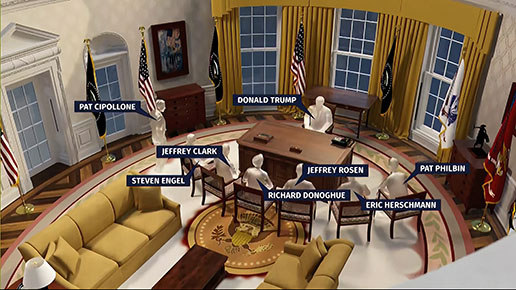 This exhibit from video released by the House Select Committee shows where people sat at an Oval Office meeting with former President Donald Trump on Jan. 3, 2021, during which Trump considered naming Jeffrey Clark acting attorney general after Attorney General Jeffrey Rosen resisted his calls to intervene in the election. (AP/House Select Committee)
This exhibit from video released by the House Select Committee shows where people sat at an Oval Office meeting with former President Donald Trump on Jan. 3, 2021, during which Trump considered naming Jeffrey Clark acting attorney general after Attorney General Jeffrey Rosen resisted his calls to intervene in the election. (AP/House Select Committee)Gallery: House's January 6 panel meets, 6-23-22
